"The projects initiated through the fund leave a positive, long-lasting legacy for faculty, staff and students with a collective dedication to sustainability."
"The projects initiated through the fund leave a positive, long-lasting legacy for faculty, staff and students with a collective dedication to sustainability."
You must complete the online application and the budget template to be considered as an applicant by the identified deadline.
There is one program application date per calendar year, and the application is open for 60 days.
Once the applications have been reviewed by the Sustainability Office, those who have been selected to proceed with the applications process will be given a two week window to create a pitch presentation which will be reviewed by the Sustainable Projects Selection Committee.
The Sustainable Hawk Fund Application period is now closed and will reopen in fall 2026.
Complete the online application. Your project should fit into one of the main themes in the Sustainability Action Plan (e.g., waste, climate, engagement, diversity, etc.).
Along with the application, you may submit any of the optional supporting documentation listed below via email:
Submit the budget template via email to dmcgregor@wlu.ca. To complete the budget template:
All students, staff, and faculty are eligible to apply to the Sustainable Hawk Fund.
For additional details on expense reimbursement, see the Funding Policy.
When you submit the budget template in the application, consider the eligible and ineligible expenses. If there is an expense that you have that is not listed and you are unsure of whether it qualifies, contact the outreach and programs officer, before you submit your application.
After the applications are reviewed, the next stage will be identifying projects that will present a project pitch.
Applications are evaluated based on the following criteria.
The Sustainable Projects Selection Committee is tasked with judging all the final pitches. The committee is comprised of a mix of staff, faculty, and students who provide their input and feedback on project proposals.
Your project pitch must:
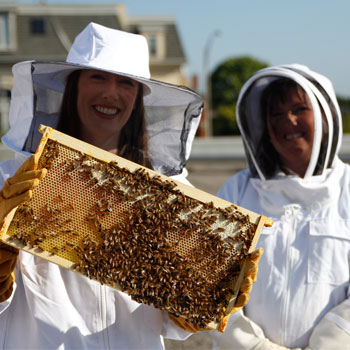
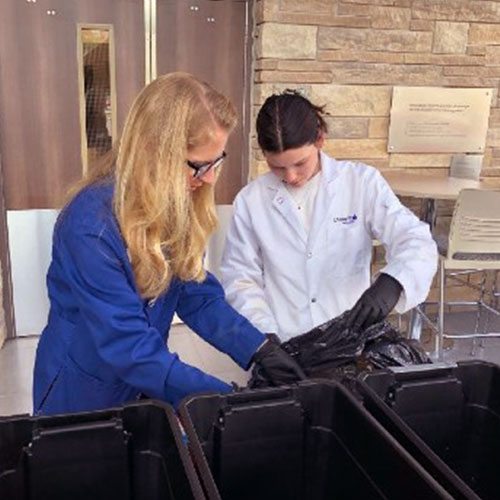
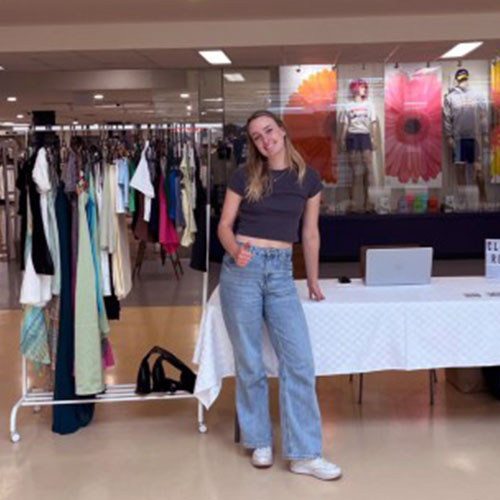
The Sustainable Hawk Fund was launched in September 2015 and has funded many projects to date. Will your idea be the next great sustainability initiative on campus?
Led by Laksh Brar.
This project aims to enhance water management practices on Laurier's Waterloo campus by implementing rain barrels, auditing Laurier's exisiting water refill stations, and working with Facilities and Asset Management to assess feasibility of an enhancement to the existing greywater system in Lazaridis Hall.
Led by Mickey Nielsen.
This project aims to divert single-use plastics in Laurier's Biology and Chemistry teaching labs, which will help prevent up to 67,000 gloves from ending up in the landfill through a recycling program. This project also enhances the My Green Labs program.
Led by Sohan Rasul.
This projects aims to create a work transition program for autistic post-secondary students, including peer-to-peer networking, career-readiness training and the development of neuro-inclusivity training at Laurier.
Led by Angela Demarse.
This project aims to provide free hygiene products to students in need as part of the Distro program, allowing funds to be reallocated to other necessities such as food. This project is rooted in mutual aid, community care, anonymity, and supporting students mental and physical wellbeing.
Led by Chad Van Dyk.
This pilot project aims to reduce the use of paper in a variety of processes in select areas of the Athletics department. It will assess the feasability of a widespread transition to digital platforms that will support waste reduction on campus, increase amdminstrative efficiency, and reduce operational risk.
Led by Christina Han.
This project builds on the previous Summit for Creative Community Solutions to support a collaborative event that brings together the Laurier community and external partners to showcase panels, performances, and keynotes on a variety of topics related to reconciliation, resilience and sustainability.
Led by Urvi Budhiraja.
This pilot project aims to create a SustAIn app, which will use AI to reduce household food waste through behavioural change. The pilot involves working with internal departments to understand current student behaviours and creating awareness events on campus.
Led by Kassidy Morency.
This project aims to provide students with an immersive experience into parks across the Waterloo Region, where they can engage with healing practices to support mental health and promote sustainability.
Led by Hannah Castell.
This project focuses on reducing fast fasion waste on campus. The clothing rental service allows for garments to be continuously reused, reducing textiles going into landfill and reducing the need for new items to be purchased.
Led by Ricky Jasson.
This project aims to enhance student access to fresh produce during the fall and winter seasons. The green wall will feature various types of produce available to students on the Waterloo campus.
Led by Maia Flinton.
This project venture aims to circulate Laurier-branded merchandise back into the community. The thrifted threads project will also feature educational workshops on waste reduction and the importance of reuse.
Led by the Geography and Environmental Studies department.
This project will focus on incorporating biophilic design principles into a collaborative workspace for graduate students. Features will include moss art with living and artificial plants.
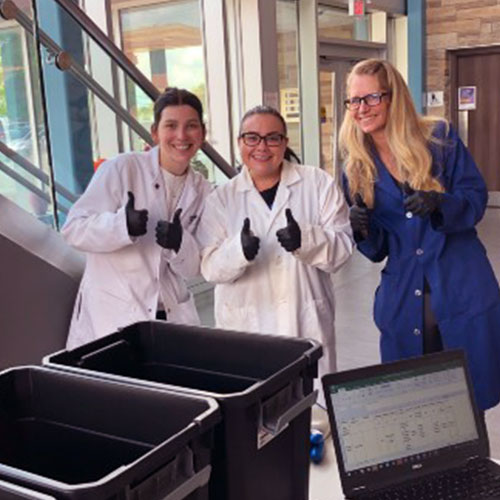
Led by Gena Braun.
This certification project aims to introduce sustainable processes into science and research laboratories at Laurier. This non-credit certificate supports a culture of sustainability on campus by exploring new processes and technologies, sourcing sustainable products, procuring less harmful materials, and reducing waste, energy, and water consumption.
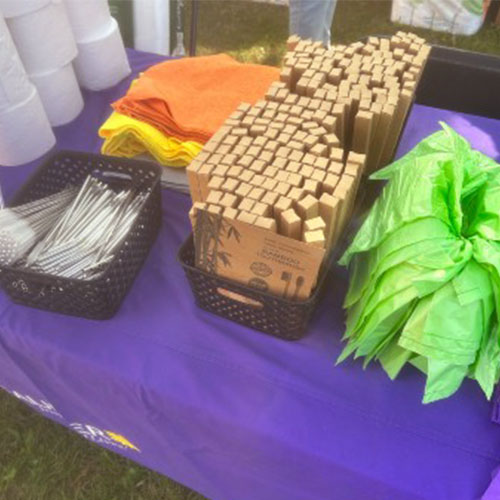
Led by Megan Csanits.
This project provides Laurier students moving back to campus with more sustainable choices for household items including laundry detergent, menstrual care products, and hygiene items. Items were available during pop-up events at Laurier’s Waterloo campus.
Led by Ron Daniels.
This project will engage students in a 12-hour race of radio-controlled electric cars with limited battery lives. Battery changes will be conducted by robots that students must design and build. The project challenges students to create innovative and sustainable solutions to real-world problems.
Led by Claire Howarth.
This event series will provide students an opportunity to make their own meals while learning about food security, budgeting, and nutrition. The project addresses physical, mental, and financial wellness on campus through promotion of social sharing, mutual aid, and raising awareness about intersectional issues.
Led by Lucas Benjamin.
This project aims to recycle scrap materials and plastic waste created by 3D printers at Laurier and within the local community. The recycled waste will be processed into new materials to introduce a circular supply chain.
Led by Jennifer Dunlop.
This initiative will distribute kits to people experiencing homelessness in Brantford. Kits contain items to support physical and mental well-being and will be distributed by Laurier Social Work students working in community-based placements.
Led by Jaskaran Dhaliwal.
This project focuses on refurbishing electronic waste and making it usable by students seeking affordable, second-hand electronics. The project will also aim to create awareness about e-waste recycling at Laurier and in the local community.
Led by Yining Zou
This project aims to teach students about building robots through sustainable, cost-effective methods. Through a series of hands-on workshops, students will salvage and build new technologies, with the series culminating in the creation of a large robotic jellyfish.
Led by Christine McKinlay.
The project aims to address declining honeybee populations by providing managed colonies at the One Market Building on Laurier's Brantford campus. The project invites Laurier students to volunteer caring for the colonies and learn about pollinators and their importance in the ecosystem.
Led by Ann Marie Beals and Mikayla Wall.
This campaign created awareness about the Food Justice Garden initiative at Laurier’s Waterloo campus and focus on Indigenous ways of knowing, fostering relationships, and providing practical gardening skills. The goal of this campaign was to create a learning space for the entire community.
Led by Dayna Minuskin, Sophie Papernick, and Isabella Festa-Bianchet.
This project will assess feasibility, design, and implementation to create a more sustainable means of stormwater management at Laurier’s Waterloo campus. The project will introduce green infrastructure, including a rain garden and permeable pavement.
Led by Hannah Ostiguy Hopp and Jeremy Wagner.
This workshop series provided Laurier students, staff, and faculty with online cooking workshops focused on sustainability. Ingredients were provided to participants, who were shown how to prepare a variety of meals while learning about food security, food sovereignty, and food literacy.
Led by Judy Halpern.
This certificate awarded faculty, staff, and students who completed a non-credit course. Course participants learned about various topics related to sustainability and create a happiness toolkit and reflective journal.
Led by Mahdiyyah Kasmani and Angela Demarse.
This project aims to reduce the number of plastic bags destined for landfills by providing the Laurier Students’ Public Interest Research Group with reusable tote bags for its weekly distro at Martin Luther University College.
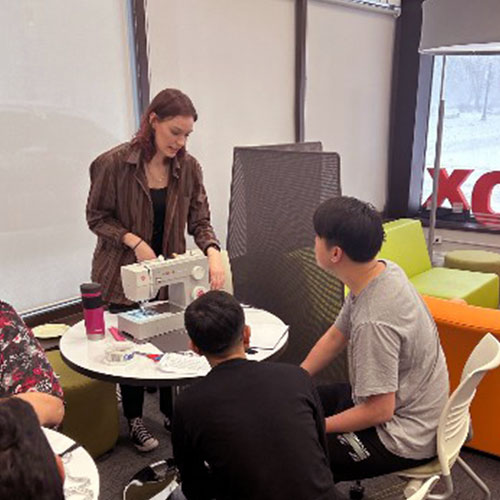
Led by Maria Lobbezoo.
This campaign provides ergonomic, transportable, and food-safe storage packs to unhoused and displaced members of the Brantford community. The campaign invited Laurier students to assist I the assembly of the packs and learn about sustainability through workshops.
Led by Shane Riley.
This project seeks to improve waste management systems in institutions, businesses, and public spaces. The project features two components: the development of an app to educate users about recycling streams and the creation of waste bins that scan items to determine their appropriate waste stream.
Led by Candy Deng.
This campaign raised awareness about a series of sustainability issues at Laurier’s Waterloo campus through themed events including trivia, a movie night, donation drive, and scavenger hunt.
Led by Ryan Brady.
This campaign educated the Laurier community about the source of microplastics and their impact on the environment. The campaign included interactive events designed to raise awareness and facilitate discussion about microplastics, including virtual discussions with Canadian experts.
Led by Ryan Brady.
The campaign will be designed to raise awareness and literacy surrounding Canada’s increasing reliance on plastics. A variety of digital postings (on social media and a website) will be designed to educate and inspire viewers. Specifically, the campaign will promote taking a 30-day challenge that will be designed to reduce everyday plastic waste.
Led by Spencer Lynn.
Has a goal to reduce waste from toothpaste tubes by creating a sustainable toothpaste option that is accessible to everyone. By re-imagining the packaging and encapsulating the dentist-recommended amount of toothpaste in a water-soluble film, they will be creating a toothpaste option that results in no packaging waste.
Led by Rosemary Ganton
A partnership to transform decorative planters on the Waterloo main campus into food gardens to support food justice amongst Indigenous students and community members. Currently, many existing planters and beds are filled with ornamental plants, where some of those planters will be replaced with a food garden.
Led by Jessica Malcolm.
This project looks to divert food that would otherwise end up in landfills. The goal is to assist restaurants in reducing their food waste in two ways. The first is through a subscription service to reduce raw ingredient spoilage and second, through providing an app for food to be picked up that is “end-of-life” at the end of the day.
Led by Lauren Barnes.
This project develops a plastic pavement solution, which will supplement a portion of bitumen (the common binding agent in traditional pavement) with low-density polyethylene one of the hardest plastics to recycle.
Led by Reena Sakram.
This project is an initiative that expands on Laurier’s current recycling program to decrease the amount of wrongfully wasted items that must be recycled properly. This Program creates convenience for students, an easier method to properly recycle their items. By introducing a program like the Smart Hawk Recycling Program, students are given the opportunity to place their used items somewhere central on campus.
Led by Kai Reimer-Watts.
Illustrations from Pooja Dhingra's series "Cut the Crap" promoting individual action will be put up in a Sustainability Corridor on-campus.
Led by Brooke Dietrich.
Proposed workshop to educate and provide alternatives to traditional menstrual products that are environmentally wasteful (i.e., landfill prevention equivalent to mass of 14 adult lions). The workshop would invite industry experts/representatives to discuss alternatives and destigmatize menstruation.
Led by Madeline McInnis.
This project will look to get battery recycling stations on campus for students to have a place to safely dispose of batteries. With the lack of options to recycle batteries on campus, this project fulfils a need that currently isn't being met on campus. Funding will be used towards finding and purchasing battery recycling drums!
Led by Akshat Soni.
HiRide is a carpooling platform that was created for post-secondary students and young professionals to be able to travel long distances more safely, efficiently, socially, and conveniently. For every 5 carpools which we facilitate, we will plant a tree in Waterloo. Funding will be used towards marketing, communication, and some software/subscription costs.
Led by Marissa Vettoretti.
EarthSuds is a social business which aims to sell a substitute for travel toiletries that is free from plastic packaging. They are piloting in individual, stand-alone hotels but we are aiming to sell to hotel franchises/chains in the growth phase of the business
Led by Lauren Barnes.
Last20 Apparel integrates PET plastics into fibres, which is its sustainable clothing brand. PET plastics are commonly found in plastic water bottles and so every article of clothing has 6 recycled plastic water bottles in it. Last20 gives people the security that their purchase is making a difference, by: upcycling bottles before they end up in landfills and oceans; educating consumers about proper recycling habits; and creating amazing repurposed apparel, and giving bottles a positive end of life solution.
Led by Jennifer Marshman.
PolliNation is a social enterprise developed through Laurier's Enactus chapter that helps the declining pollinator population and provides a solution to pollinator habitat loss. The PolliNation team will be collaborating with another SHF applicant, current PhD candidate Jennifer Marshman, to improve pollinator habitat and food sources on campus. A pollinator garden will be created to provide for pollinator conservation and to educate university students and the larger community on the needs of pollinators. It will incorporate native plants, regenerate soil, and supports pollinators.
Led by Karly Rath.
This project will transform an existing greenhouse building on Northdale campus into a year-round community hub and greenhouse filled with urban agriculture. A system will be implemented that will convert food waste into heat to grow organic produce for students and the community.
Led by Kwabena Gyetuah.
An estimated 4.5 trillion cigarette butts are littered around the world every year. This project will help keep this waste off the street. Ballot Bins are customizable ashtrays that present a question and two answers on each container. The smoker can vote by dropping their cigarette butt in one of the two glass slots. This incentivizes smokers to vote on a question rather than throw their litter on the street.
Led by Kai Reimer-Watts.
Sustainability Arts for Climate Action will implement art installations and interactive programming to leverage sustainability on campus. The project will act an as awareness-raising tool that will link different themes including environmental, social and economic sustainability.
Led by Rosemary Brockett.
This workshop will serve as a valuable opportunity for students to learn about the sustainability of the cosmetic products they use every single day. Students will learn how to make informed choices about what products to purchase, companies to support, and how to create their own products. This will allow students to position themselves in a sustainably-friendly mindset as consumers.
Led by Brooke Dietrich.
In partnership with Diva International and the Shore Centre, this workshop will educate students on alternatives to traditional menstrual products that are environmentally wasteful. It will provide Laurier students with the opportunity to learn about Diva Cups, network with others, and receive their own Diva Cup.
Led by Marissa Vettoretti.
EarthSuds is a social business that sells travel toiletries free from plastic packaging. This is done by creating solid shampoos, conditioners, and soap that exist in the form of a single-use, dissolvable strip which is packaged in biodegradable, recycled paper packaging. Visit earthsuds.co to learn more.
Led by Lauren Barnes.
LASTXX Apparel is a sustainable clothing brand that collects and properly recycles 20 plastic bottles for every item sold. They collect bottles through corporate recycling programs, community events and school bottles drives.
Led by Kristen Gilmore.
This project provides an opportunity for students to obtain accessible yet sustainable fruits and vegetables within our campus’ green space. Two to three self-maintaining vertical barrel gardens will be placed in pilot locations to supply space to grow fruits, vegetables, herbs and flowers.
"The Sustainable Hawk Fund enables the Laurier community to create and implement environmental, social and financial sustainability projects as part of campus life."
This policy has been developed to ensure the Sustainable Hawk Fund (SHF) operates with integrity throughout the process of engaging students, faculty, and staff to integrate sustainability practices into student life at Laurier.
The process herein will provide guidance on the requirements for project reporting as well as transparency for the program as a whole.
Revision date: Nov. 4, 2025
Participants in the SHF are required to prepare a project timeline, key milestones, and detailed budget at the time of funding and two progress reports during their project period: an Interim Report at a 50% milestone completion checkpoint and a Final Report upon completion. If a project is short term, they may only be required to complete a final report.
Each progress report will be submitted via email and will include the following information:
The outreach and programs officer will keep track of individual expenses for each project throughout the funding cycle.
In the event that a project is completed under budget, any unspent money will be re-allocated to the Sustainable Hawk Fund budget.
In the event that a project approaches the total funding amount awarded before the project is completed, the project team shall notify the outreach and program officer via email at dmcgregor@wlu.ca immediately. Using the equation below, a threshold of 90 percent of total budget spent shall be used to prompt such notification. It is the responsibility of the project team to monitor spending to determine if this threshold is crossed. At this point the Sustainable Projects Selection Committee shall review the project details to determine the appropriate course of action.
Wilfrid Laurier University’s Procurement and Tendering Policy 5.11 adheres to the principles and guidelines recommended and mandated by the Broader Public Sector Directive. The following are the dollar thresholds for competitive procurement as per the WLU Procurement and Tendering Policy 5.11:
$0 to $10,000[1]: One written or verbal quote is required
$10,000 to $25,0001: Please obtain a minimum of two written quotes. Where the user is unable to obtain quotes, Procurement may obtain quotes on his/her behalf as required
Additional Resources:
Procurement for projects lead by a faculty or staff member will be undertaken by the proponent (for both internal and external expenses) and allocated via reimbursement. All expenditures must be detailed in the project budget and approved by the outreach and program officer via email at dmcgregor@wlu.ca at project initiation. Following written approval (via email), the proponent may commence with procurement in accordance with the Wilfrid Laurier University’s Procurement and Tendering Policy 5.11 (including required quotes and order instructions). All expenses will be reimbursed to the proponent provided:
Student-led projects may require expenditures both internal and external to campus. All expenditures must be detailed in the project budget and approved by the outreach and program officer via email at dmcgregor@wlu.ca at project initiation. Following written approval (via email), the proponent may commence with procurement in accordance with the Wilfrid Laurier University’s Procurement and Tendering Policy 5.11 (including required quotes and order instructions). Procurement and payments for expenses will be undertaken by the project team following the hierarchy below:
Wages and salaries are not eligible expenses.
In the event the project proponent is a student/faculty/staff lead business venture, or the project pivots into a business venture during its implementation, procurement will be undertaken as follows. All purchases and expenses will be undertaken by the proponent and funding will be allocated via reimbursement. All expenditures must be detailed in the project budget and approved by the outreach and program officer via email at dmcgregor@wlu.ca at project initiation. Following written approval (via email), the proponent may commence with procurement in accordance with the Wilfrid Laurier University’s Procurement and Tendering Policy 5.11 (including required quotes and order instructions). All expenses will be invoiced to the Sustainability Office for fulfilment and will be processed in a timely manner.
Wages and salaries are not eligible expenses.
Laurier’s Brand Standards shall be adhered to when using logos and designing other materials that represent the university.
Any on-campus catering will be sourced through approved on-campus vendors:
[1] Please note that these thresholds exclude Consulting Services. All consulting services require the invitation of a minimum of three suppliers to bid regardless of dollar value, including those instances where services have been offered free of charge. For requirements where the pre-tax value of the services will be $100,000 or more, the opportunity must be publicly posted.
[2] If financial constraints prevent student from paying for out-of-pocket expenses, contact the Sustainability Office to make funding arrangements.